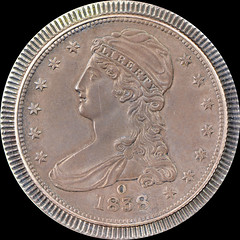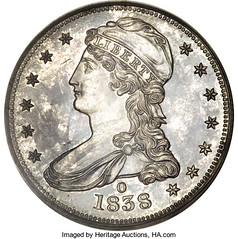
PREV ARTICLE
NEXT ARTICLE
FULL ISSUE
PREV FULL ISSUE
1838-O HALF DOLLARS MISIDENTIFIED?Kin Carmody submitted these notes on the 1838-O Half Dollars. Thanks. -Editor SOME 1838-O HALF DOLLARS MAY HAVE BEEN MISIDENTIFIED AS COUNTERFEITS
For nearly 100 years, it has been universally accepted by numismatic experts that the 1838-O half dollar was a PROOF ONLY issue, and all specimens had an identifying (GR-1) die crack running through the Recent research by Dannreuther and Flynn (ALIGNMENT OF THE STARS published in 2015) has established that there were two different production runs of 1838-0 half dollars in New Orleans in 1839. The first production took place in Jan. 1839 and made exactly 10 circulation strikes before the reverse die support collapse ended the run. The second, in late March 1839, made PROOFS, which were sent to Mint Director Robert Patterson.
While the eight out of ten survival rate of the proofs is very high as expected, there is only one known original circulation strike. Nine originals have been lost, but it is possible a few of these
LEFT: 1838-O circulation strike
The image comparison above shows that there are way more drapery fold lines on the proof. The In late March 1839, after production of 1839-O circulation strike half dollars had begun, there was still no directive ordering the disposition of the 10 originals. It is possible that these coins were simply added into the 1839 half dollar supply destined for circulation and the production numbers adjusted accordingly. The Mint records tallied half dollars STRUCK for circulation in 1839 but did not keep specific records by coin date as this was not ever expected to be a problem. The 1838-O originals were an exception like the 1836 Gobrecht dollar struck in Jan 1837. Without specific direction, adding these few coins to the circulation 1839's would have been the easiest disposition of the 1838 originals. If this happened, any surviving circulated originals would have been quickly judged to be counterfeits because they obviously weren't proofs, and they lacked the defining GR-1 die crack. If readers are aware of any 1838-O half dollars that have been judged to be counterfeits, I encourage you to reevaluate them based on this article, and please contact me through The E Sylum for further information.
Wayne Homren, Editor The Numismatic Bibliomania Society is a non-profit organization promoting numismatic literature. See our web site at coinbooks.org. To submit items for publication in The E-Sylum, write to the Editor at this address: whomren@gmail.com To subscribe go to: https://my.binhost.com/lists/listinfo/esylum All Rights Reserved. NBS Home Page Contact the NBS webmaster 
|


